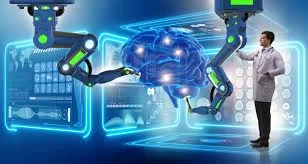
Introduction: The Digital Shift in Modern Healthcare
In the rapidly evolving world of medical technology, AI-powered healthcare systems are setting new standards in diagnosis, patient care, and operational efficiency. From robotic-assisted surgeries to AI chatbots guiding patients through symptom checkers, artificial intelligence is no longer a futuristic vision—it’s a practical reality in today’s smart hospitals. These intelligent systems are now outperforming traditional diagnostic methods, sometimes even surpassing the speed and accuracy of human doctors.
The Power of AI in Modern Diagnostics
One of the most transformative aspects of artificial intelligence in hospitals is its diagnostic capability. Machine learning models trained on millions of patient records, X-rays, MRIs, and other data can detect patterns invisible to the human eye. For instance, AI systems can identify early signs of cancer, heart disease, or neurological conditions faster and more accurately than traditional methods.
Unlike conventional systems that rely heavily on manual entry and analysis, AI diagnostic tools operate in real-time, cross-referencing thousands of similar cases instantly. This capability minimizes errors, reduces diagnosis time, and accelerates treatment planning—all while enhancing patient safety.
Smart Hospital Innovations and Real-Time Decision Making
Today’s smart hospitals integrate healthcare automation technology across departments. Whether it’s AI-driven triage tools in emergency rooms or automated data analysis in radiology, these innovations are drastically improving how care is delivered.
AI systems can:
Prioritize critical patients based on symptoms.
Recommend personalized treatment options.
Monitor patient vitals 24/7 using predictive analytics.
Automate administrative tasks like medical coding and billing.
With these systems in place, healthcare professionals can spend more time on patient care and less on paperwork or repetitive tasks. The result? A hospital that’s not only smarter but also more humane.
Benefits Over Traditional Diagnosis Methods
The advantages of AI medical diagnosis extend well beyond speed:
Consistency: AI algorithms apply the same logic every time, avoiding human biases.
Scalability: Once trained, systems can be deployed across multiple hospitals or clinics simultaneously.
Precision: The integration of AI with medical imaging has led to precision medicine, where treatments are tailored based on genetic, environmental, and lifestyle factors.
Cost-Effectiveness: Early diagnosis reduces the cost of treatment and improves prognosis, helping both patients and healthcare providers manage resources efficiently.
Challenges and Ethical Considerations
Despite the potential, AI-powered healthcare systems face challenges. Data privacy, algorithmic bias, and the lack of regulatory frameworks can limit their full-scale adoption. Moreover, there’s the crucial question of accountability—who is responsible when an AI system makes a mistake?
Smart hospitals must establish clear guidelines, involve human oversight, and prioritize ethical design in every AI implementation. Building trust in these technologies is essential for long-term success.
WhatsApp Integration: A Bridge Between Patients and AI
As AI continues to reshape diagnostics, communication channels like WhatsApp are playing a pivotal role in connecting patients with these systems. Hospitals now use WhatsApp bots for:
Booking appointments
Sharing diagnostic reports
Providing instant responses to medical queries
Sending medication reminders
Integrating AI-powered healthcare systems with WhatsApp and similar platforms ensures that technology doesn’t remain confined to hospital walls—it reaches patients directly, enhancing accessibility and engagement.
The Future Outlook: A Hybrid Healthcare Ecosystem
The future of healthcare lies in a hybrid ecosystem where artificial intelligence complements human expertise. Doctors will rely on AI not to replace their judgment but to enhance it. Smart hospitals will continue to evolve with cloud-based platforms, IoT medical devices, and seamless data sharing systems.
As AI diagnostic tools become more sophisticated and accessible, we can expect:
Expanded use in rural and underserved areas
Better chronic disease management
Proactive and preventive healthcare models
More time for doctors to focus on complex, emotional, and human aspects of care
Conclusion: Embracing the AI-Powered Future of Healthcare
AI-powered healthcare systems are not just a trend—they are a necessity for the future of medicine. From improving diagnostic accuracy to streamlining communication via platforms like WhatsApp, the synergy between AI and healthcare holds the promise of smarter, faster, and more efficient medical care.
Hospitals that invest in this transformation today are not only preparing for the future—they’re shaping it.